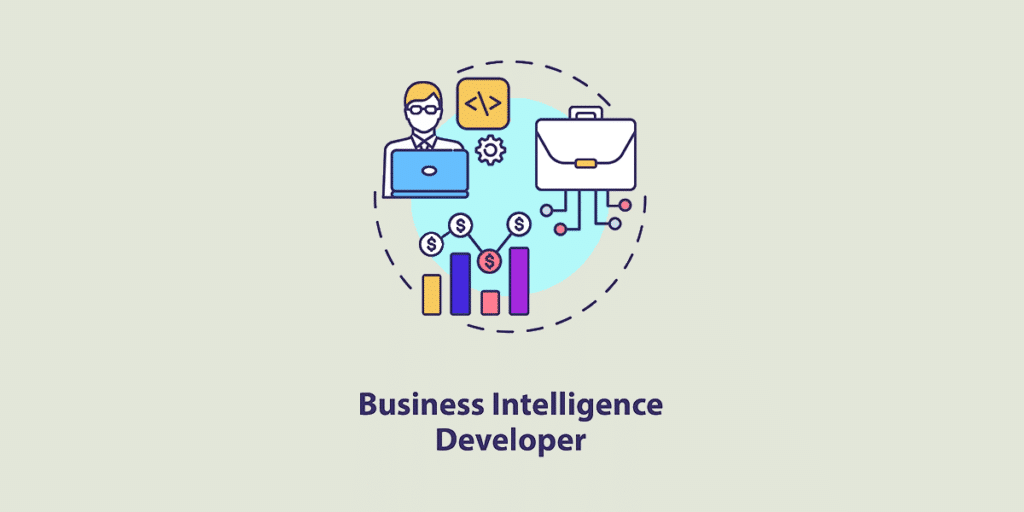From sales and finance to human resources and logistics, a company's data concerns absolutely every department. But in order to bring maximum value to the organization, it is essential to interpret and understand this information. This is where the BI developer comes in.
So what exactly is it? What is its role? Its skills? How much do they earn? And above all, how do you become a business analysis developer? That’s what we’re going to look at in this article.
What is a BI developer?
Business intelligence helps end-users to make informed decisions by exploiting the information available within the organization. In other words, it’s the ability to interpret raw data into relevant information. For example, identifying growth opportunities, increasing margins, analyzing employee productivity, detecting risks and threats, reducing waste and costs, and so on.
All this is made possible through various BI strategies and technologies, such as dashboards, reports and other data visualization solutions.
The BI developer is responsible for designing, organizing and maintaining all these tools. In doing so, they ensure that all users have easy access to the information they need.
Good to know: unlike other data experts, this profession is far from recent, with the first business intelligence experts appearing as early as the 1980s. Today, however, their role has changed considerably, thanks to the proliferation of data.
What role does the BI developer play in the data process?
While the BI developer is an indispensable part of the data enhancement process, it only comes into play at the end. Very often, the use of data within organizations relies on the ETL system (extraction, transformation, loading). Here’s how it works:
- Extraction: this involves retrieving information from a multitude of raw data sources (such as the cloud, company databases, social networks, etc.). This is mainly the role of the data engineer.
- Transformation: this involves cleansing the data to make it fit for use and exploitation. Once in the right format, the data is loaded into a centralized storage space (data lake, data warehouse…).
- Loading: at this stage, the idea is, among other things, to encourage the use of data. This is precisely where the BI developer comes in. More precisely, in the reporting phase. He will extract the company’s data and display it clearly enough for all stakeholders to understand the added value of the data.
That said, depending on the project and the size of the company, the role of the BI developer can vary considerably. In some cases, he or she will be primarily responsible for reporting. While in others, the BI developer’s responsibility encompasses the creation of data pipelines, data mining, data model research, or even business intelligence projects.

What are the missions of a business intelligence expert?
Whatever the organization, the BI developer’s ultimate goal is to facilitate the exploitation of data by end-users. To achieve this, they must fulfill a number of tasks:
- Reporting: he or she must be able to formulate the company’s needs through various solutions, such as business intelligence tools, dashboards and reports. These tools must always be adapted to the company’s specific needs and challenges.
- The creation of applications and software: this enables stakeholders to make full use of the available data. To this end, the BI developer creates tools to extract data and present it to end-users.
- Once again, the software must meet the exact requirements of the company. The business intelligence expert must therefore be able to transform business needs into technical specifications for the development team.
- Development, deployment and maintenance of BI tools: this includes writing technical documentation for these tools (e.g., to carry out tests or resolve bug problems).
- Participation in database design: working closely with the data engineer.
💡Related articles:
In some organizations, business intelligence developers must also supervise teams and help deploy AI interfaces.
What skills does a BI developer need?
Mastering both the technical aspects and the business stakes, the BI developer must have a set of essential skills.
On the technical side, these include the following prerequisites:
- Coding ;
- Database design and management (SQL and no SQL);
- BI tools (such as Power BI, Tableau, Oracle BI…).
In terms of soft skills, the BI developer must possess the following qualities:
- A genuine business appetite: he or she must have in-depth knowledge of the sector in order to more easily understand the relevance of data for end-users.
- Analytical skills: this will enable them to solve problems and develop the best development strategies.
- Communication skills: he/she needs to collaborate with data engineers, technical managers, decision-makers and end-users.
How much does a business intelligence developer earn?
The business intelligence expert is a vital link in any organization, promoting relevant, well-informed decision-making. This justifies a relatively high salary.
According to Glassdoor, the average salary for BI developers in France is €41,500.
How do I become a BI developer?
How to become a BI developer Not only in terms of tools, but also in terms of working methods. Companies often require at least a bachelor’s degree in computer science or another IT-related field.
To develop your skills, you can also join one of Datascientest’s training courses.










